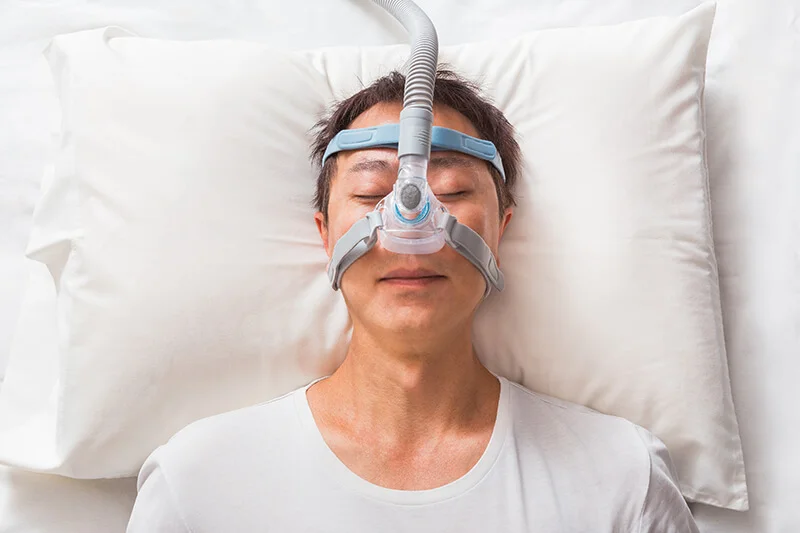What Causes Sleep Apnea?
Sleep apnea occurs when breathing repeatedly stops during sleep. These pauses have different causes. In central sleep apnea (CSAS), the problem starts in the brain — often due to neurological damage, such as after a stroke, or in some cases because of genetic factors. Certain medications and alcohol can also trigger breathing interruptions.
The most common type, however, is obstructive sleep apnea (OSAS). Here, the muscles that should keep the airway open become too weak, causing the airway to collapse. Severe obesity can make this worse by increasing pressure on the chest. OSAS affects around 5–10% of the population, and studies show that up to 80% of people with severe obesity have this condition.
Why Sleep Apnea Often Goes Unnoticed
Most people with sleep apnea are not aware of the pauses in their breathing. It is usually the partner who notices loud snoring followed by silence — sometimes long enough to feel alarming. Although breathing eventually resumes with a deep gasp, the repeated oxygen drops leave people feeling constantly tired, unrefreshed, and mentally foggy. Many report headaches, exhaustion, and reduced concentration. In severe cases, sufferers may fall into microsleep during the day, which is especially dangerous while driving.
Possible Health Consequences
Sleep apnea doesn’t only disturb sleep — it puts strain on the entire body. OSAS increases the risk of high blood pressure, heart failure, heart attacks, and strokes. Men may develop erectile dysfunction. Other associated conditions include sudden hearing loss, depression, stomach ulcers, and type 2 diabetes. Without treatment, sleep apnea significantly affects both physical and emotional health.
How Sleep Apnea Is Diagnosed
If you suspect OSAS, the first step is to consult your physician. After a detailed examination, your doctor may recommend polysomnography or a polygraph test to measure breathing, heart rate, oxygen levels, and sleep patterns. In many cases, you can take the monitoring devices home to record data overnight. Additional assessments by ENT specialists or diabetologists may be necessary. Sometimes, a night in a sleep laboratory provides the most accurate results.
Treatment Options
When sleep apnea is confirmed, CPAP therapy is often the most effective solution. Wearing a small mask during sleep keeps the airway open and prevents collapse. After a short adjustment period, most patients experience significant relief, better sleep, and improved daytime energy.
In some cases, a mouthguard that adjusts the jaw can help. Certain people may benefit from surgery, especially if enlarged tonsils or polyps are contributing to the blockage. Rarely, removal of excess tissue in the throat (uvulopalatopharyngoplasty) is recommended. Some individuals find relief by using devices that prevent them from sleeping on their back, such as a small backpack-like support.
How Weight Loss Surgery Helps Sleep Apnea
One of the well-documented benefits of weight loss surgery is the improvement — and in many cases, resolution — of sleep apnea. As the body loses a significant amount of weight, pressure on the airways decreases, and breathing becomes easier. Many patients are able to stop using their CPAP device within a few months.
Sleep apnea is just one of several conditions that can improve or even disappear after weight loss surgery, alongside type 2 diabetes, high blood pressure, joint problems, and infertility.



